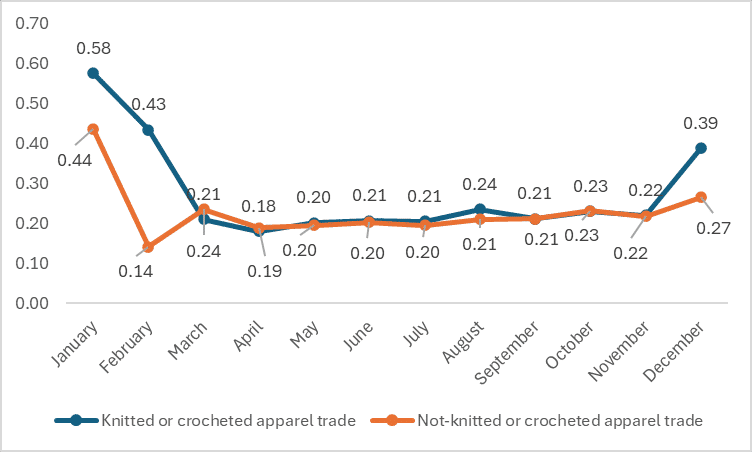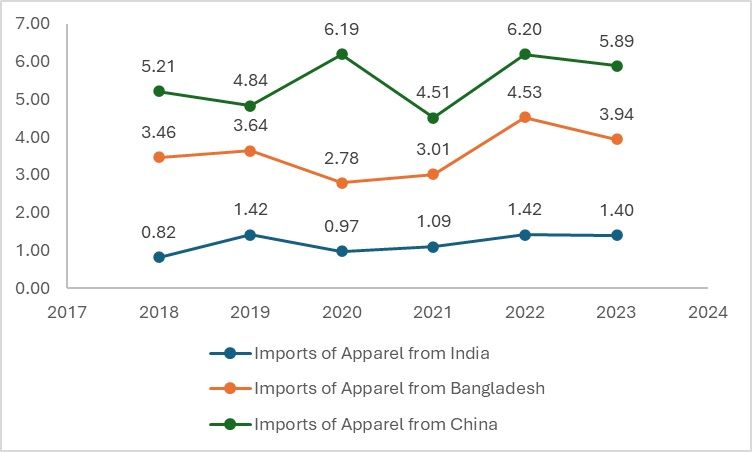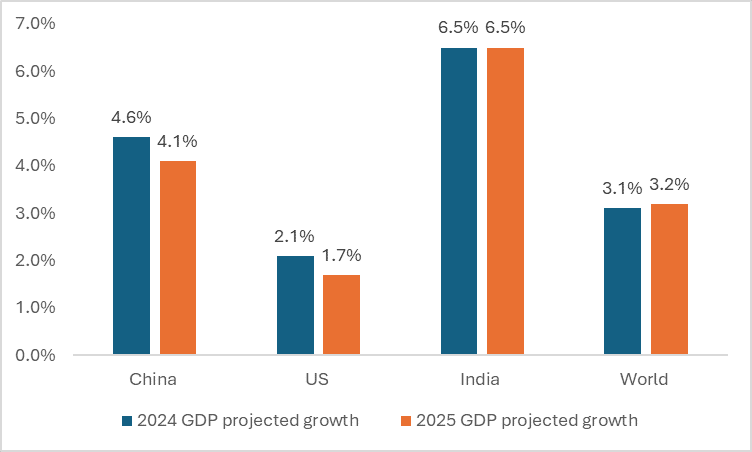
Reasons for the downfall
Europe and the US are facing immense pressure due to a variety of conditions—both international and unique domestic factors that impact the functioning of their economies. Europe, on the other hand, has become one of the most vulnerable economies due to the Russia-Ukraine war and the increasing cost of living in those countries caused by a strain in the supply of gas from Russia. Additionally, the UK economy is under stress due to persistently high inflation, structural weaknesses in the labour market, and low manufacturing growth, which in turn have affected instrumental sectors of the economy such as construction and services. The significant sanctions imposed on Russia have placed countries in the European region under economic strain. The UK is the first country to collapse in Europe, while Germany is also at risk of entering a recession. UK's GDP contracted by 0.1 per cent in the third quarter of 2023 and by 0.3 per cent in the fourth quarter.
Although this has been termed as only mild inflation, significant problems can potentially arise globally. In this globalised world, a recession in any major nation can trigger a domino effect in other nations. The two most important variables that can affect other nations are international trade and any other trade or economic negotiations. The UK falling into recession can impact many countries and can also present numerous opportunities in disguise for a country like India. However, it is important to consider how it can affect trade.
Trade turmoil
It is a well-established fact that as the economy enters a recession, or even a mild one for that matter, consumer demand gradually declines, particularly since Russia initiated a war with Ukraine. This has resulted in fluctuations in the country's imports over time. Recent data from 2023 published by the UK Trade Authority indicates a decline in imports of knitted and crocheted apparel categories compared to non-knitted or crocheted apparel, which experienced a boost in December.
Figure 1: Imports of apparel by UK from non-EU countries (in £ mn)

Source: Gov.uk
According to the International Monetary Fund (IMF), demand is significantly affected during a recession, regardless of its intensity. Additionally, there is a reduction in expenses accompanied by a slew of trade restrictions. These restrictions encompass the total imports the country can afford, aiming to conserve foreign exchange reserves as the currency also experiences a downturn. Consequently, trade is likely to be impacted, as was the case with the UK.
Relationship between trade and GDP
There exists a close relationship between GDP and trade. According to the Economic Observatory, for every 1 per cent decrease in GDP, trade falls by 2 per cent. Comparing this to the current economic situation, the UK's GDP contracted by 0.3 per cent in December 2023, while trade deteriorated by approximately 29 per cent compared to November. With restrictions imposed on the volume of trade a country can engage in, there is a higher likelihood that other trade policy negotiations will also be delayed.
India and the UK are in the midst of finalising a Free Trade Agreement (FTA), but the current recession may potentially result in a delay in signing the agreement. The nations are encountering issues such as rules of origin and determining which products can enter their respective markets at zero tariffs. Indian apparel attracts an import duty of 9.41 per cent for knitted and crocheted apparel, and 9.18 per cent for non-knitted and crocheted apparel. However, there has also been a reduction in apparel imports from India due to the recent economic conditions in the UK. Figure 2 illustrates that overall apparel imports from India have declined from 1.42 million to 1.40 million. A similar reduction is also observed in another significant country from which the UK imports. Imports from Bangladesh and China have fluctuated significantly over the past two years compared to India, whose imports are more or less following a linear trend.
Figure 2: UK's apparel imports from different sources (In $ mn)

Source: ITC Trade Map
India-UK FTA and trade relations
India serves as a major source of textile and apparel products for the UK, with trade steadily increasing on a linear basis. Unlike the fluctuations observed in imports from countries like Bangladesh and China, trade with India has maintained a consistent upward trend. Beyond apparel trade, the two countries engage in commerce across various other commodities. Therefore, the conclusion of the FTA holds significant importance for India. Indian apparel products currently face tariffs ranging from 9.18 per cent to 9.48 per cent. The implementation of the FTA has the potential to enhance market access for Indian textile products. Considering that the EU and UK collectively account for approximately 50 per cent of India's apparel export market, the FTA carries immense importance for the country.
Indian resilience
India, on the other hand, exhibits greater resilience compared to other European countries. According to the IMF, India is projected to grow by 6.7 per cent in 2024 and 2025, outpacing countries such as the US and China. With the world as a whole expected to grow at 3.2 per cent in the next year, India's resilience stands out. This resilience can be attributed to India's robust presence in the agricultural sector, which helps the country withstand economic downturns.
Figure 3: Projected growth of countries according to IMF (in %)

Source: IMF
The gap between developing and developed nations is narrowing, creating a fertile ground for India to capitalise on the situation and take the lead. This applies not only to textiles but also to other sectors, enabling an increase in exports.
In conclusion
While the mild recession may temporarily delay some key trade agreements and reduce trade for a short period, the current atmosphere is not likely to significantly impact many nations as long as the negative growth trend is reversed and trade resumes at a normal pace.
ALCHEMPro News Desk (KL)
Receive daily prices and market insights straight to your inbox. Subscribe to AlchemPro Weekly!